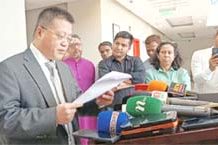C T Online Desk: The state-owned Bangladesh Road Transport Corporation is facing resistance from private operators to launch and maintain bus services on various routes across the country while the relevant authorities turn a blind eye, activists and experts said.
The situation, which has held the passengers hostage, is attributed to the charging of extra fares by private bus companies, their poor services, and their propensity to maintain their monopoly on the market.
In recent periods, the corporation faced such resistance in Sunamganj, Faridpur, and Shariatpur districts.
According to the Bangladesh Road Transport Corporation Act, 2020, the BRTC is authorised to operate motor transport on any route for carrying passengers and goods.
On August 13, Sunamganj Zila Paribahan Malik-Shramik Oikya Parishad threatened to enforce an indefinite strike demanding the cancellation of BRTC bus operations on the Sylhet-Sunamganj road.
Sunamganj District Bus Owners’ Association general secretary Jewel Miah accused the BRTC buses of running at their whim and taking most of their passengers.
BRTC buses have been running on this route intermittently since 2015, Sunamganj District Bar Association president Rabiul Lais Rokes said on Friday, adding that as a conscious citizen he was always in favour of the service in the district.
‘Whenever BRTC launches its service on the Sylhet-Sunamganj route, private operators create resistance,’ he said, adding, ‘private operators not only charge extra for their services, their behaviour towards passengers is also very bad.’
While the private operators were doing this to maintain their monopoly, there was no justification and legal basis for obstructing BRTC buses on any route, he added.
Sacheton Nagorik Committee Sunamganj vice-president Khalil Rahman said that they had been demanding quality bus services on the route for around 20 years.
He added that private operators continued to hold passengers hostage by charging extra, giving bad services and obstructing BRTC buses from running the route.
The manager of the BRTC Sylhet bus depot, Md. Arifur Rahman Tushar, told New Age that on August 15 a meeting with the bus operators was held at the office of Sunamganj deputy commissioner, Jahangir Hossain.
During this meeting, BRTC was asked to run only four buses on the route at six fixed times and to move its counter.
He said that earlier they had a rented bus counter at the Janata Eye Hospital area in Sunamganj city and after not getting space anymore they relocated it to the Tahirpur area.
‘Private operators obstructed us and called the strike,’ he said, adding that following the August 15 meeting, they put a temporary counter at the previous area, where passengers were not coming due to the absence of seating arrangement and fixed timetable.
Sunamganj deputy commissioner Jahangir Hossain on Thursday said that it was not his concern to find a counter for BRTC.
‘BRTC buses on this route are not regular, so it is a problem for the passengers,’ he said.
After the inauguration of Padma Bridge to traffic movement on June 26, Shariatpur private bus operators created similar resistance to BRTC bus service on the Shariatpur-Dhaka route, claiming that these buses did not have permission to run.
Shariatpur Inter-District Bus and Minibus Owners’ Group chairman Faruque Ahmed Talukder told New Age that on June 27, at a meeting of the regional transport committee, chaired by the Shariatpur district deputy commissioner, the BRTC was allowed to run six buses on the route via three upazilas but was barred from taking passengers from the district headquarters.
But currently, the corporation was running around 20 buses on the route against 52 buses run by private operators, he said.
‘We applied for route permits for our buses but have not received any yet,’ he added.
New Age correspondent in Shariatpur reported that on the route, the private bus operators charge Tk 300 for a seat on a non-air-conditioned bus, while a non-AC BRTC bus charges Tk 280.
‘We want more BRTC buses here as they charge government-fixed fares and their services are also good,’ said Abul Kalam Bepari, a passenger at the bus stand.
The private bus operators in Faridpur on August 10 obstructed the movement of BRTC buses on the Boalmari-Dhaka route, a day after the inauguration of the service.
The corporation resumed the operation the next day while the locals protested against the private operators’ resistance.
‘The unholy nexus between politics and business is the main reason for this scenario,’ said Road Safety Foundation chairman AI Mahbub Uddin Ahmed, also a Dhaka University supernumerary professor.
He alleged that almost all government agencies in the country were corrupt, and the private bus operators were taking advantage of the situation to continue their monopoly.
‘In Bangladesh, all public interest services have been entirely eliminated,’ he said, adding that the government should take strict action against any attempt to monopolise business by private operators.
The Road Transport and Highways Division secretary, ABM Amin Ullah Nuri, told New Age that such resistance from private bus operators was normal as it went against their business interests.
‘They [the private bus operators] do it without understanding the matter, so we technically handle them,’ he said, without explaining the word ‘technically.’
BRTC deputy general manager (operation) Sukdev Dhali said that they had permission to run buses anywhere in the country and they would do it.
According to the latest available data, until May 31, the corporation has 1,600 buses running on 196 routes across the country.













